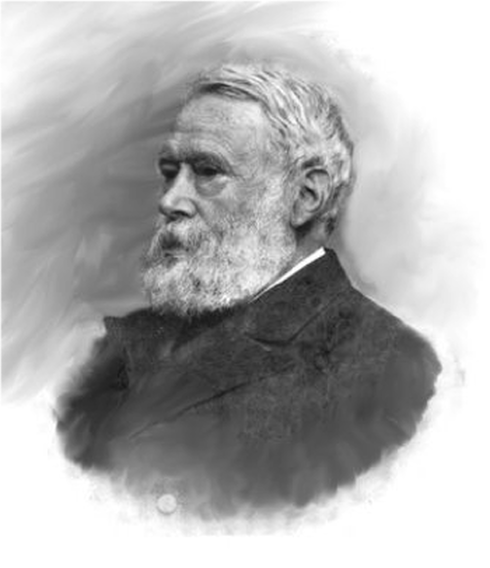Supporters of the Edinburgh 7
Whilst the Edinburgh Seven undoubtedly faced an immense amount of opposition during their attempts to pursue a medical career, they did equally receive a great deal of support.
Lecturers // Professor Masson
Jex-Blake’s initial unsuccessful application to study medicine at Edinburgh was met with great support from Professor Masson, a Professor of Rhetoric and English Literature at the university. Others who supported her included Sir James Young Simpson, a professor of Obstetrics and Gynaecology who was a pioneer of obstetric anaesthesia as well as the Dean of the Medical Faculty.

Professor Masson. Various [Public domain], via Wikimedia Commons
Professor Masson remained one of the Edinburgh Seven’s main supporters throughout their time at Edinburgh University, advocating and assisting the women in any way he could. The university court’s ruling against Jex Blake’s initial application stated that it was too inconvenient to provide separate lectures and resources for only one woman, and thus he submitted a proposal, that the women should be allowed to attend the same lectures as men, a proposal which would unfortunately become unsuccessful.
The Scotsman
The Scotsman newspaper editor, David Russel, was a good friend of Jex-Blake’s and there’s no doubt that his influential role played a key part in her eventual success in matriculating at Edinburgh. He wrote articles detailing Jex Blake’s story and allowed her to reach out to other women through the newspaper and encourage them to apply alongside her. This rendered the university’s court ruling against her initial application obsolete, and thus arguably helped to overturn the court’s decision, allowing the women to matriculate.
The Scotsman also demonstrated its support for the women by writing articles comparing the UK’s stance on granting women a medical education against Europe’s, whose policy change to allow women to matriculate occurred much earlier. The articles published were always optimistic regarding the women’s position, and there is no doubt that they played a vital role in promoting the support they received from the public.
The Public
The Surgeon’s Hall riot, whilst in itself a demonstration of the resistance faced by the women, equally triggered a wave of support. It enabled the debate to enter the public eye through national newspapers such as The Times, who wrote supportive articles challenging the arguments against the women. Much of the public were very supportive of the women’s cause and this arguably helped the women persevere in the face of all the rejection they faced from many influential members of the university (see Opposers post).
Committee for Securing a Medical Education
A Committee for Securing a Medical Education to the Women in Edinburgh was established during the debate in favour and support of the women. It was led by The Lord Provost of Edinburgh and comprised over 300 members, amongst which was Charles Darwin. As well as taking care of the campaign’s financial burden which had previously been done by Jex-Blake, the Committee also paid for the costs of an action for libel brought against Jex-Blake by a student who she recognised as the leader of the Surgeon’s hall riot.
Fellow male students
While many of the male students who studied alongside the Edinburgh Seven demonstrated great opposition to their presence, (see Opposers post), some of their fellow male students were horrified by the abuse and injustice the women faced during the events of the Surgeon’s hall riot. They consequently agreed to start escorting the women around campus to protect them from the intimidation they often faced from other students.
The support received from the Edinburgh Seven came from all manner of places. From influential people such as Charles Darwin and the editor of the Scotsman newspaper, to faculty staff, teaching doctors and their fellow male comrades. The national interest which eventually occurred as a result of the riots also saw much of the public in favour of the women.
Author- Cari O’Rourke
References:
http://dangerouswomenproject.org/2016/04/26/sophia-jex-blake/#_ftnref4
Bell E Moberly. (1953). Storming the Citadel: the Rise of the Women Doctor
https://www.undiscoveredscotland.co.uk/usbiography/y/sirjamesyoungsimpson.html




Recent comments